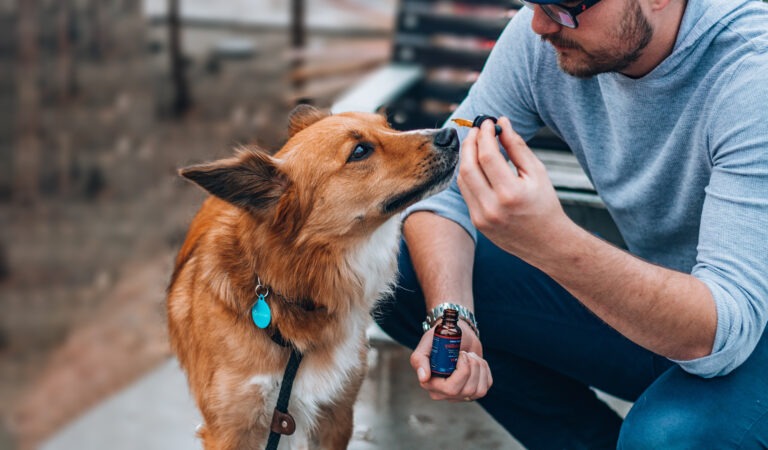Melatonin, a naturally occurring neurohormone, has long been thought to work as a sleeping aid in humans. Now there’s some evidence it may be useful for several dog conditions. Its sedative properties have been helpful in treating separation anxiety in dogs, as well as stress from noise like fireworks, thunderstorms or other noise phobias.
What Dogs Should Take Melatonin?
Melatonin can be helpful for dogs with severe anxiety. There are plenty of uses, and other evidence suggests that melatonin for dogs successfully treats some forms of hair loss (Dog alopecia). Melatonin can assist with:
- Dog cognitive dysfunction
- Dogs who are blind
- Noise phobias
- Separation anxiety
- Seasonal alopecia
Is Melatonin Safe for My Dog?
While some pet owners like the natural properties of melatonin as opposed to chemical medications, you should talk to your veterinarian before deciding on a melatonin regimen. There has not been much study of its side effects and safety, nor has it been approved by the FDA for use in animals.
Pros and Cons of Melatonin for Dogs
| Pros of Melatonin for Dogs | Cons of Melatonin for Dogs |
|---|---|
| 1. Calming Effects: Helps in calming anxious dogs, especially during stressful events like thunderstorms or fireworks. | 1. Consultation with a Veterinarian: Before giving your dog melatonin, it’s crucial to seek advice from a veterinarian. |
| 2. Improved Sleep: For older dogs experiencing sleep disturbances, melatonin can promote better rest, leading to improved overall well-being. | 2. Potential Side Effects: Some dogs may experience side effects such as sleepiness, upset stomach, or confusion. |
| 3. Hair Growth Support: Some dogs with certain types of hair loss may benefit from melatonin supplementation, aiding in regrowth. | 3. Interactions with Medications: Melatonin may interact with certain medications your dog is taking. |
| 4. Fear Reduction: Dogs with high levels of fear or phobias may find relief with melatonin, allowing them to cope better with stress. | 4. Not FDA Approved: Melatonin is not officially approved by the FDA for use in animals. |
| 5. Brain Health Support: In aging dogs, it can provide support for brain function, potentially improving cognitive abilities. |
F.A.Q
What Are the Side Effects of Melatonin in Dogs?
The most common side effect of melatonin in dogs is lethargy or drowsiness. Other potential side effects include upset stomach, changes in fertility, increased heart rate, itching, and confusion. Always monitor your dog after giving melatonin for any adverse reactions.
How Much Melatonin Should I Give My Dog?
The appropriate dosage of melatonin for dogs varies based on their weight. Here’s a general guideline:
- Extra Small Dogs (Less than 5 kilograms): 0.5 milligrams every 8 hours
- Small Dogs (5 to 15 kilograms): 0.5 – 1.5 milligrams every 8 hours
- Medium Dogs (15 to 30 kilograms): 1.5 – 3 milligrams every 8 hours
- Large Dogs (30 to 50 kilograms): 3 – 5 milligrams every 8 hours
- Extra Large Dogs (Over 50 kilograms): 3 – 5 milligrams every 8 hours
Always consult your vet for the correct dosage based on your dog’s specific needs and health conditions.
When Should I Give My Dog Melatonin?
If using melatonin to help your dog relax before bedtime or during stressful events, administer it approximately two hours before the desired effect. This allows enough time for the melatonin to take effect.
Can I Use Human Melatonin for My Dog?
No, it’s not recommended to use human melatonin for dogs. Human formulations may contain ingredients that are harmful to dogs, such as xylitol, a sweetener that can be toxic to pets. Always choose melatonin specifically made for dogs.
Where Can I Get Melatonin for My Dog?
Melatonin supplements made for dogs are available at pet stores, veterinary clinics and online. Before buying, talk to your vet for advice on the best option for your dog.
How Long Can I Use Melatonin for My Dog?
The duration of melatonin use for your dog should be determined by your vet. While it can be used for short-term situations like anxiety during fireworks or thunderstorms, long-term use should be discussed with a professional.
What Should I Do If My Dog Shows Negative Reactions to Melatonin?
If your dog experiences any negative reactions to melatonin, such as severe lethargy, vomiting, or unusual behavior, stop administering it immediately and contact your vet. It’s essential to monitor your dog’s response to any new medication or supplement.







